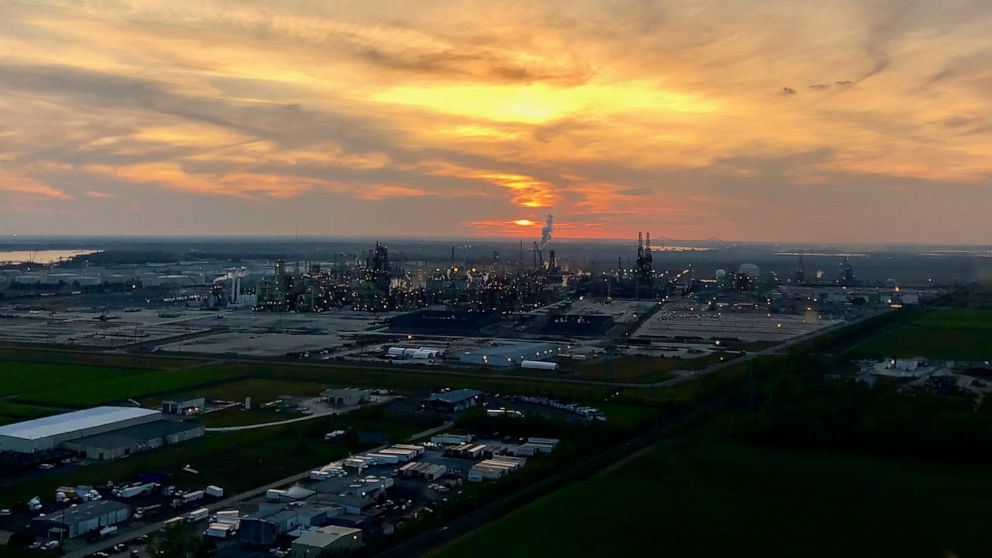Battle over carbon capture as tool to fight climate change
Last year, Congress pledged $3.5 billion to carbon capture and sequestration projects around the United States, which has been called the largest federal investment ever by advocates for the technology
14 April 2022, 06:35
8 min read
Share to FacebookShare to TwitterEmail this article
3:17
Catch up on the developing stories making headlines.
The Associated PressPolly Glover realized her son had asthma when he was nine months old. Now 26, he carries an inhaler in his pocket whenever he’s out and about in Prairieville, Louisiana, part of Ascension Parish.
“He probably needs to leave Ascension quite frankly,” Glover says, but he hasn’t because “this is his home and this is our family and this is our community.”
The parish is part of the 85-mile (137-kilometer) span between New Orleans and Baton Rouge officially called the Mississippi River Chemical Corridor, more commonly known as Cancer Alley. The region's air quality is some of the worst in the United States, and in several places along the corridor, cancer risks are much higher than levels considered acceptable by the U.S. Environmental Protection Agency.
Glover says the air is “terrible” where she lives, but there’s also great biodiversity — osprey, eagles, migratory birds, deer, rabbits, fish and alligators — among the region's lakes, rivers and wetlands. The environmental advocate has been working for 30 years to preserve the place she’s loved since childhood.
That’s why she is wary of anything that might make air quality worse or threaten wildlife — and her biggest fear now is that a $4.5 billion plant designed to capture climate-changing carbon and make clean-burning hydrogen fuel will actually do more harm to the Lake Maurepas basin.
The blue hydrogen energy plant is slated to be built and operated by Air Products and Chemicals, a multinational petrochemical company. The company says the plant will capture airborne carbon emissions created during production and put them safely underground — a process called carbon capture and storage.
“Sometimes I think people think you’re kind of bubbling this in at the bottom of the lake,” said Simon Moore, vice president of investor relations, corporate relations and sustainability at Air Products. “You know, this is a mile below the Earth’s surface, where the geological formation of the rock has this porous space, which simply absorbs the CO2.”
Still, Glover is worried. “I’m not a scientist. I’m a mom who cares,” she said. “We have got to be better stewards of the environment and while reducing carbon emissions is necessary, injecting them into the basin is not the answer.”
There are several other carbon capture and storage projects proposed or in the works throughout the U.S., including in Louisiana, Texas, Minnesota, Michigan, Iowa and California. Companies behind them maintain they can successfully remove carbon from the air to reduce pollution, then safely transport and store the carbon underground — or do both.
In some cases, oil and gas companies are banking on this new technology to either help build new profit centers, such as plants that make hydrogen, or extend the lifespan of their fossil fuel facilities.
Carbon capture and storage projects are gaining traction since Congress approved $3.5 billion for them last year. The Global CCS Institute, a think tank seeking to advance these projects globally, called it the “single largest appropriation of money for CCS in the history of the technology.”
In the latest report from the United Nations Intergovernmental Panel on Climate Change, the world's top scientists said carbon capture and storage technology has to be part of the range of solutions to decarbonize and mitigate climate change. But they said solar and wind energy and electricity storage are improving faster than carbon capture and storage.
Opponents of carbon capture and storage maintain the technology is unproven and has been less effective than alternatives such as solar and wind at decarbonizing the energy sector.
“Carbon capture is neither workable nor feasible,” said Basav Sen, climate justice policy director for the Institute for Policy Studies, a progressive think tank based in Washington, D.C. “It’s merely an excuse for the fossil fuel industry to keep operating the way it does.”
A study in late 2020 by researchers from the University of California, San Diego, found over 80% of 39 projects that have sought to commercialize carbon capture and storage ended in failure. The study cited lack of technological readiness as a top factor
But even if the technology was deployed successfully, several critics say the projects would pose threats to the public health of communities long plagued by air and water pollution.








